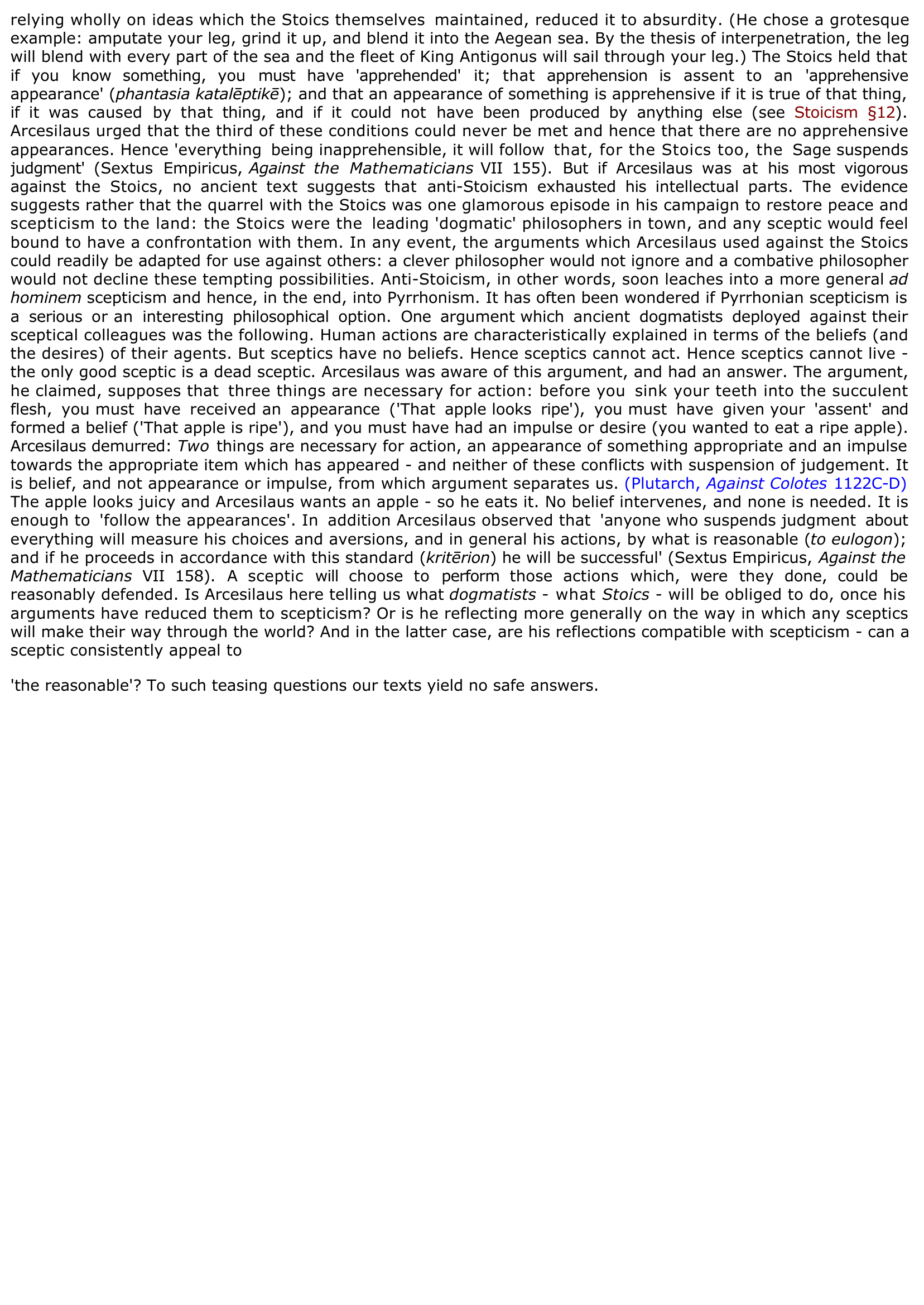Arcesilaus
Publié le 18/01/2010

Extrait du document
Arcesilaus of Pitane came to Athens as a young man, and was seduced by Platonic philosophy. Around 265 he became head of the Academy. He turned the school in a sceptical direction, urging that Plato himself had been of a sceptical bent. He revived the Socratic practice of dialectical argument, in which he displayed remarkable logical skill and honeyed oratorical talent. His dialectical prowess led him to 'suspend judgment about everything'; but the main target of his arguments was Stoicism, and in particular Stoic epistemology, which he claimed to reduce to incoherence. Recognizing that a sceptic must live and act, he introduced the notion of 'the reasonable' as a criterion of sceptical action. 1 Life and thought Arcesilaus was born in Pitane, in north-west Asia Minor. As a youth he was a pupil of the mathematician Autolycus, whom he followed to Sardis. He then travelled to Athens where he studied with Theophrastus. He was destined for a rhetorical career; but his head lay for philosophy. When he removed to the Academy and heard Polemo and Crantor and Crates, he deemed that they were 'either gods or else remnants of those men of old who were formed from the golden generation' (Philodemus, History of the Academy XV 5-10). The rest of his life he spent in the Academy. On the death of Crates in c.265 BC he became scholarch, a position he held until his death some twenty-five years later. He was a celebrated figure, known for caustic wit and also for kindness, for oratorical skill and for the rigour of his argumentation. He wrote epigrams, he enjoyed dalliance and dinner parties - and he was regarded as one of the leading philosophers of the age. But he produced no philosophical writings, and what we learn of his views derives from hearsay: perhaps from first-hand hearsay, for we are told that one of his pupils, Pythodorus, took notes of his lectures.
«
relying wholly on ideas which the Stoics themselves maintained, reduced it to absurdity.
(He chose a grotesqueexample: amputate your leg, grind it up, and blend it into the Aegean sea.
By the thesis of interpenetration, the legwill blend with every part of the sea and the fleet of King Antigonus will sail through your leg.) The Stoics held thatif you know something, you must have 'apprehended' it; that apprehension is assent to an 'apprehensiveappearance' ( phantasia katal ēptik ē ); and that an appearance of something is apprehensive if it is true of that thing, if it was caused by that thing, and if it could not have been produced by anything else (see Stoicism §12 ). Arcesilaus urged that the third of these conditions could never be met and hence that there are no apprehensiveappearances.
Hence 'everything being inapprehensible, it will follow that, for the Stoics too, the Sage suspendsjudgment' (Sextus Empiricus, Against the Mathematicians VII 155).
But if Arcesilaus was at his most vigorous against the Stoics, no ancient text suggests that anti-Stoicism exhausted his intellectual parts.
The evidencesuggests rather that the quarrel with the Stoics was one glamorous episode in his campaign to restore peace andscepticism to the land: the Stoics were the leading 'dogmatic' philosophers in town, and any sceptic would feelbound to have a confrontation with them.
In any event, the arguments which Arcesilaus used against the Stoicscould readily be adapted for use against others: a clever philosopher would not ignore and a combative philosopherwould not decline these tempting possibilities.
Anti-Stoicism, in other words, soon leaches into a more general ad hominem scepticism and hence, in the end, into Pyrrhonism.
It has often been wondered if Pyrrhonian scepticism is a serious or an interesting philosophical option.
One argument which ancient dogmatists deployed against theirsceptical colleagues was the following.
Human actions are characteristically explained in terms of the beliefs (andthe desires) of their agents.
But sceptics have no beliefs.
Hence sceptics cannot act.
Hence sceptics cannot live -the only good sceptic is a dead sceptic.
Arcesilaus was aware of this argument, and had an answer.
The argument,he claimed, supposes that three things are necessary for action: before you sink your teeth into the succulentflesh, you must have received an appearance ('That apple looks ripe'), you must have given your 'assent' andformed a belief ('That apple is ripe'), and you must have had an impulse or desire (you wanted to eat a ripe apple).Arcesilaus demurred: Two things are necessary for action, an appearance of something appropriate and an impulse towards the appropriate item which has appeared - and neither of these conflicts with suspension of judgement.
Itis belief, and not appearance or impulse, from which argument separates us.
(Plutarch, Against Colotes 1122C-D) The apple looks juicy and Arcesilaus wants an apple - so he eats it.
No belief intervenes, and none is needed.
It isenough to 'follow the appearances'.
In addition Arcesilaus observed that 'anyone who suspends judgment abouteverything will measure his choices and aversions, and in general his actions, by what is reasonable ( to eulogon ); and if he proceeds in accordance with this standard ( kritērion ) he will be successful' (Sextus Empiricus, Against the Mathematicians VII 158).
A sceptic will choose to perform those actions which, were they done, could be reasonably defended.
Is Arcesilaus here telling us what dogmatists - what Stoics - will be obliged to do, once his arguments have reduced them to scepticism? Or is he reflecting more generally on the way in which any scepticswill make their way through the world? And in the latter case, are his reflections compatible with scepticism - can asceptic consistently appeal to
'the reasonable'? To such teasing questions our texts yield no safe answers..
»
↓↓↓ APERÇU DU DOCUMENT ↓↓↓

































